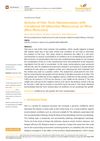 39 citations,
September 2016 in “Expert Opinion on Drug Delivery”
39 citations,
September 2016 in “Expert Opinion on Drug Delivery” New drug delivery methods can make natural compounds more effective and stable.
 39 citations,
September 2013 in “Journal of Cosmetic Dermatology”
39 citations,
September 2013 in “Journal of Cosmetic Dermatology” Herbs can potentially treat hair loss by inhibiting a key enzyme and promoting hair growth, and deficiencies in zinc, biotin, and iron are linked to hair loss.
 38 citations,
July 2012 in “international journal of endocrinology and metabolism”
38 citations,
July 2012 in “international journal of endocrinology and metabolism” Some plant-derived compounds may help with hormonal conditions, but more research is needed to confirm their effectiveness.
 31 citations,
January 2017 in “Phytotherapy Research”
31 citations,
January 2017 in “Phytotherapy Research” Ziziphus jujuba Mills may have health benefits, but more research is needed to confirm its safety and effectiveness.
 25 citations,
July 2017 in “Archives of Dermatological Research”
25 citations,
July 2017 in “Archives of Dermatological Research” Herbal products might promote hair growth with fewer side effects, but more research is needed to confirm their safety and effectiveness.
 19 citations,
August 2010 in “Journal der Deutschen Dermatologischen Gesellschaft”
19 citations,
August 2010 in “Journal der Deutschen Dermatologischen Gesellschaft” Certain plant extracts can effectively treat skin conditions like athlete's foot, chronic vein problems, sun damage, skin growths, vitiligo, and hair loss, and may also improve skin appearance.
 16 citations,
September 2018 in “Journal of Ethnopharmacology”
16 citations,
September 2018 in “Journal of Ethnopharmacology” Plant-based remedies may treat hair loss by reducing inflammation and improving insulin resistance.
 9 citations,
March 2011 in “Oxidative stress and disease”
9 citations,
March 2011 in “Oxidative stress and disease” Some herbal treatments are effective for skin disorders, but more research and regulation are needed.
 6 citations,
October 2017
6 citations,
October 2017 Indian Gooseberry has potential for cancer prevention and treatment and promotes hair growth.
 4 citations,
October 2016
4 citations,
October 2016 Herbs like aloe vera and amla are effective and safe for treating hair loss.
 3 citations,
August 2013 in “International journal of research in Ayurveda and pharmacy”
3 citations,
August 2013 in “International journal of research in Ayurveda and pharmacy” Hairbac tablet and oil significantly improve hair texture, density, and reduce hair loss without side effects.
 3 citations,
June 2004 in “Alternative and Complementary Therapies”
3 citations,
June 2004 in “Alternative and Complementary Therapies” The document concludes that hair loss is influenced by genetics and other factors, and while treatments like finasteride can help, they have limitations and side effects.
 2 citations,
May 2022 in “Ethnobotany research and applications”
2 citations,
May 2022 in “Ethnobotany research and applications” Traditional medicinal plants are still widely used and could help local development and inter-ethnic relationships.
 1 citations,
August 2023 in “Frontiers in immunology”
1 citations,
August 2023 in “Frontiers in immunology” Traditional Chinese medicinal foods may help manage long-term post-COVID symptoms.
 1 citations,
June 2023 in “International journal of basic science in medicine”
1 citations,
June 2023 in “International journal of basic science in medicine” Adiantum capillus-veneris may help with respiratory issues, but more research is needed.
 1 citations,
September 2022 in “KnE medicine”
1 citations,
September 2022 in “KnE medicine” Candlenut oil hair tonic helps mice grow hair, with higher oil concentration giving better results.
 1 citations,
June 2022 in “International Journal of Health Sciences (IJHS) (En línea)”
1 citations,
June 2022 in “International Journal of Health Sciences (IJHS) (En línea)” Herbal hair oils help with hair problems and are safer than synthetic products.
 1 citations,
January 2021 in “Dermatologic Therapy”
1 citations,
January 2021 in “Dermatologic Therapy” Trichobiolight effectively treats hair loss with 82.5% success.
 1 citations,
August 2020 in “Food Research”
1 citations,
August 2020 in “Food Research” Plant extracts like Avicennia marina, Boehmeria nipononivea, and Camellia sinensis could potentially treat hair loss with fewer side effects than synthetic drugs.
 1 citations,
October 2017 in “Elsevier eBooks”
1 citations,
October 2017 in “Elsevier eBooks” Antiandrogens can treat female hormonal conditions, but environmental ones may harm reproductive health.
 1 citations,
January 2017 in “Social Science Research Network”
1 citations,
January 2017 in “Social Science Research Network” The document suggests creating a secure database for indigenous knowledge and recommends that the TKDL actively fight patents that slightly alter traditional knowledge.
 1 citations,
December 2013 in “Turkderm”
1 citations,
December 2013 in “Turkderm” Use of cosmeceuticals during pregnancy and breastfeeding is not recommended due to insufficient safety data.
 1 citations,
January 2013 in “Springer eBooks”
1 citations,
January 2013 in “Springer eBooks” Cosmeceuticals may benefit skin health but need more research for efficacy and safety confirmation.
 January 2025 in “International Journal of Advanced Research in Science Communication and Technology”
January 2025 in “International Journal of Advanced Research in Science Communication and Technology” Herbal shampoos effectively promote hair growth and control dandruff using traditional herbs and modern technology.
 August 2024 in “Indian Journal Of Clinical Practice”
August 2024 in “Indian Journal Of Clinical Practice” A balanced diet and healthy lifestyle help manage PCOS symptoms.
 March 2024 in “International Research Journal Of Modernization In Engineering Technology And Science”
March 2024 in “International Research Journal Of Modernization In Engineering Technology And Science” Certain plants like Aloe vera and Neem are effective and safe for treating various skin conditions.
 March 2024 in “Tropical Journal of Natural Product Research”
March 2024 in “Tropical Journal of Natural Product Research” Many people in Fez-Meknes use potentially toxic plants for various health and cosmetic purposes, but more research is needed to ensure their safety.
 December 2023 in “Research in pharmacy”
December 2023 in “Research in pharmacy” Phytotherapeutic compounds and supplements can help manage Polycystic Ovarian Syndrome (PCOS).
 December 2023 in “Migration letters”
December 2023 in “Migration letters” Herbal treatments can help manage PCOS symptoms.
 December 2023 in “International Journal of Science and Research (IJSR)”
December 2023 in “International Journal of Science and Research (IJSR)” Herbal treatments are effective and preferred for hair loss with fewer side effects.






























